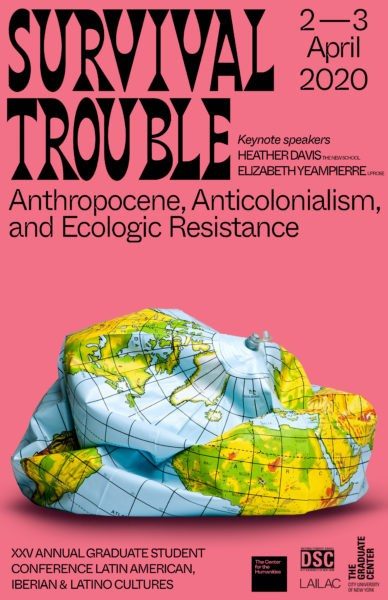EVENT POSTPONED
****This event has been postponed, please check back here on our website (or sign up for our mailing list here for updates) about rescheduling and more information regarding this event.
Join us for “Survival Trouble: Anthropocene, Anticolonialism, and Ecologic Resistance,” the 25th Annual Latin American, Iberian and Latino Cultures (LAILC) graduate student conference at the Graduate Center, CUNY, featuring Keynote speakers Heather Davis (Culture and Media at Eugene Lang College, The New School) and Elizabeth Yeampierre (Executive Director of UPROSE).
There exists no place on this planet where the trace of human existence is not felt, whether it be indirectly or directly. Irreversible changes to our Earth have generated inevitable human resistance, from the anticolonial initiatives of indigenous groups to the youth marches taking place in the world’s largest cities. We can classify this current geologic period—marked by the drastic transformation of terrestrial happenings due to human behavior—with the term anthropocene. The anthropocene is evidence of the devastating biophysical consequences of the dominating socioeconomic system of the modern day. Ecology is inevitably involved in this discussion, as it is central to the uprising demands in justice, equality, and inclusion that are taking place across the globe in the fight for survival. In our consideration of the anthropocene, we ask ourselves: what changes in our modes of being and doing, and what political actions are fundamental to combat social and ecologic injustices? The geologic metaphor of the anthropocene spurs us to consider how hegemonic impositions generate irrevocable erosion in the harmonic structures of life. At the same time, this current ecologic crisis offers the possibility to imagine and recognize other political, economic, and discursive orders in the production, cohabitation, and power relations between all forms of life, human and nonhuman.
In this 25th annual LAILAC graduate student conference, we aim to explore how the irruption of environmental humanities enriches the possibilities for cultural, literary, audiovisual, sociolinguistic, anthropological, media, and artistic studies related (but not limited to) the following themes:
- Aesthetics and the poetics of the anthropocene
- Ecocriticism: cultural, literary, and visual studies related to the environment
- Glotopolitics and discursive analysis of climate change
- Capitalism, survival, and precarity
- Indigenous resistance, social movements, and political action
- Borders, transnationalism, legislation, and environmental responsibility
- Diaspora, displacements, and migrations
- Coloniality and decoloniality: biopolitics, affect, and vulnerabilities
- Anti-racist ecology
- Crisis, disasters, and climate emergencies
- Ecofeminism and intersectionality
- Posthumanism
- Material violence: extraction, deforestation, and pollution Futures and temporalities: apocalyptic narratives and utopias
Co-sponsored by the Latin American, Iberian and Latino Cultures (LAILC), the Center for the Humanities, and the Doctoral Students' Council at The Graduate Center, CUNY.



